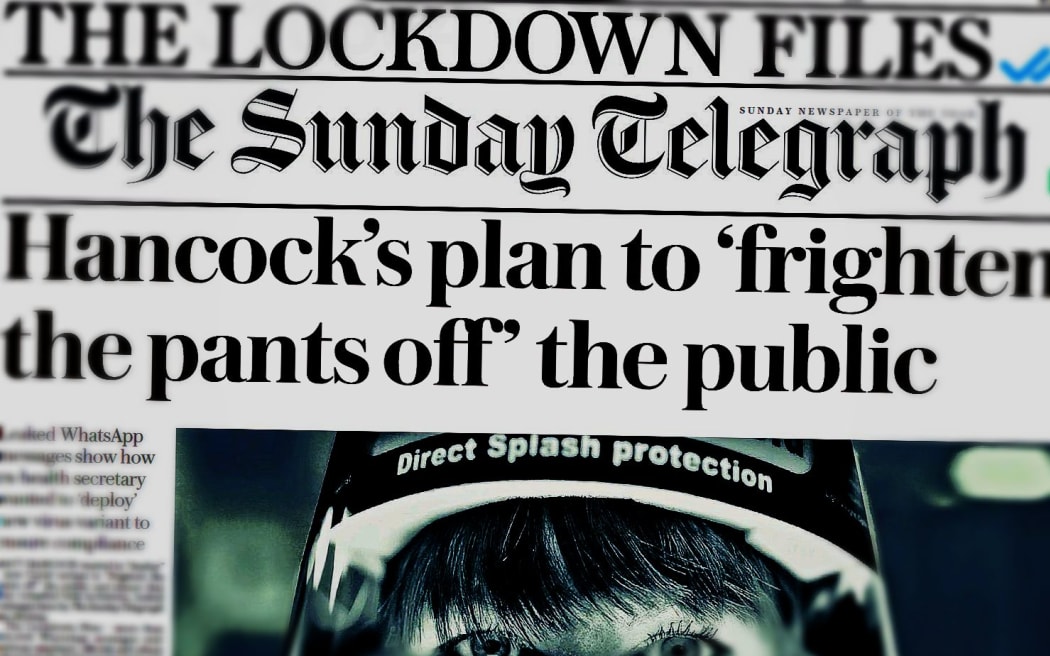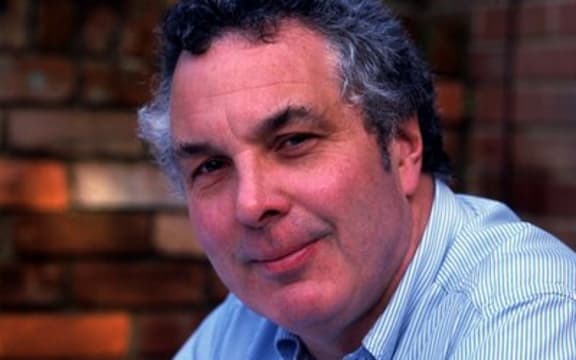An RNZ investigation this week revealed ministers and their staff are messaged by lobbyists using apps out of the public gaze - but discoverable under the OIA. In the UK, one minister’s messages exposing ‘government by WhatsApp’ are also in the headlines because of one journalist brutally betraying her source - and kicking off an angry ethical debate.

The UK's Sunday Telegraph newspaper filled eight pages with stories from more than 100,000 WhatsApp messages from the former health minister, leaked by his biographer Isabel Oakeshott. Photo: RNZ Mediawatch
Earlier this week the Prime Minister told RNZ any citizen or group can also get their concerns in front of a government minister.
Just like lobbyists, they can submit on legislation and appear before Select Committees at Parliament to influence decisions, he said.
But this week RNZ’s Guyon Espiner cast doubt on claims our system is transparent.
His RNZ investigation Mate, Brother, Comrade hinged on what he was eventually able to discover using the Official Information Act.
“I've seen thousands of emails, text messages, and even encrypted Signal communications between lobbyists, politicians, and their staff . . . to try to get what the clients want,” he said.
In the UK, the channels ministers use to communicate with advisors and lobbyists, outside the official ones, is at the heart of a major scoop in the press there.
The revelations also lead the New Zealand Herald’s world news section here when it broke.
“The former British health secretary wanted to “deploy” a new Covid variant to “frighten the pants off the public” and ensure that they complied with lockdown,” said the Herald, citing The Lockdown Files - a series in one of the Herald’s news partners, the UK’s Sunday Telegraph.
The Telegraph opposed lockdowns in the UK and pushed hard against some Covid countermeasures. Some of its writers ridiculed New Zealand’s Covid suppression strategy as well.
Neither Matt Hancock nor his government was actually planning to release a new Covid strain n the UK. They were merely kicking around the idea of how to exploit it to push the ‘stay at home’ message.
But the revelations filled eight pages of the paper the day it broke - and plenty more in the following days.
The scoop was based on more than 100,000 WhatsApp messages between Matt Hancock and his officials and others.
Remarkably, Hancock was the source of the scoop because he handed the What’sApp massage cache to his biographer Isabel Oakeshott who he'd engaged to write a book about his handling of the Covid crisis.
Oakeshott had already turned out several books about British politicians, millionaires and billionaires who fancied seeing their stories in print. And most of the made their subjects look pretty good.
But others had been burned by her books - such as former PM David Cameron.
The Matt Hancock book - The Pandemic Diaries - didn’t fly off the shelves this year as he would have hoped.
But the newspapers serialising the scandals in his messages lately have.
They’ve also sparked a big row about ethics.
Oakeshott has been unrepentant about the stone-cold betrayal of her source.
She has pushed back against accusations she’s a muckraker-for-hire - or that as a vocal opponent of Covid restrictions, she is now making mischief in a paper that shared her views on that.
“Anyone who thinks I did this for money must be utterly insane. This is about the millions of people adversely affected by the catastrophic decisions to lock down this country repeatedly, often on the flimsiest of evidence for political reasons,” she told the BBC’s Today programme.
“The very small number of people who were aware of these WhatsApps pretty much said to me: ’You actually have a moral duty to bring this stuff out. In the end, you've got to decide what is most important.' Is it my relationship with Matt Hancock? No,” she told the News Agents podcast.
“If I have an agenda at all, it is as a journalist getting to the truth and somebody who cares about what happened during the pandemic. So no, my priority is not protecting my relationship with Matt Hancock,” she said.
She went on to say she had “nuclear weapons” - stuff in the cache of messages which would further damage Hancock's already shattered reputation but was not necessarily in the public interest. She warned Hancock “not to poke the hornets’ nest.”
Paul Lashmar is an investigative reporter and a journalism professor at City University in London.

Investigative reporter and researcher Paul Lashmar. Photo: supplied
“I'm used to dealing with ethical questions, but this one's complicated because Isabel Oakeshott is a real one-off with a track record of revealing information about from her sources and breaking confidentiality agreements,” he told Mediawatch.
“One senior economist in this country has gone to prison because she admitted to Isabel Oakeshott off the record that she had taken her husband's traffic offences. Both of them were then prosecuted and the economist Vicki Price had to go to jail,” he said.
“I don't know what Matt Hancock must have been thinking when he decided to use her as a ghostwriter.” he said.
“She had an agenda to demonstrate that lockdown was a complete mess. This has been a recurring theme on the further edges of the Right in Britain - that lockdown was a disaster, mainly because they perceived that it damaged the economy and done more harm than good.”
“But there really is an interest in knowing how these decisions were made. If I had been an editor of a newspaper, I would have felt obliged to have made quite a big thing of this because it's very revealing and in the public interest,” he said.
“Ultimately you have to say that what's gone into the public domain has told us something about modern politicians. But the banality of some of these exchanges, the, you know, the cynicism is just is off the scale - where you see them trying to present things to the public to look good, rather than in the best interest of the citizens of the country,” he said.
“But it's selective to an agenda, and it is concerning she has not released the lot. It should be released all-or- nothing, unless there's something very personal that really doesn't have any public interest dimension,” he said.
“I've had a few scoops in my time but I've never operated in that way. And most journalists don't. Protecting sources is probably the most important thing we do. And if necessary, we've carried the can over it,” he said.
There’s no sign yet of Nick Hancock seeking legal remedy for the breach of any non-disclosure agreement - and the Sunday and Daily Telegraph newspapers continue to spin stories out of The Lockdown Files.
And as a result of this - and Guyon Espiner's lid-lifting series for RNZ this week - journalists and others will probably now specify WhatsApp and other chat services when requesting official information under the OIA.


